Unit 6 TV programmes Comic strip & Welcome to the unit 课件 牛津译林版九年级英语上册(27张PPT)
文档属性
| 名称 | Unit 6 TV programmes Comic strip & Welcome to the unit 课件 牛津译林版九年级英语上册(27张PPT) | 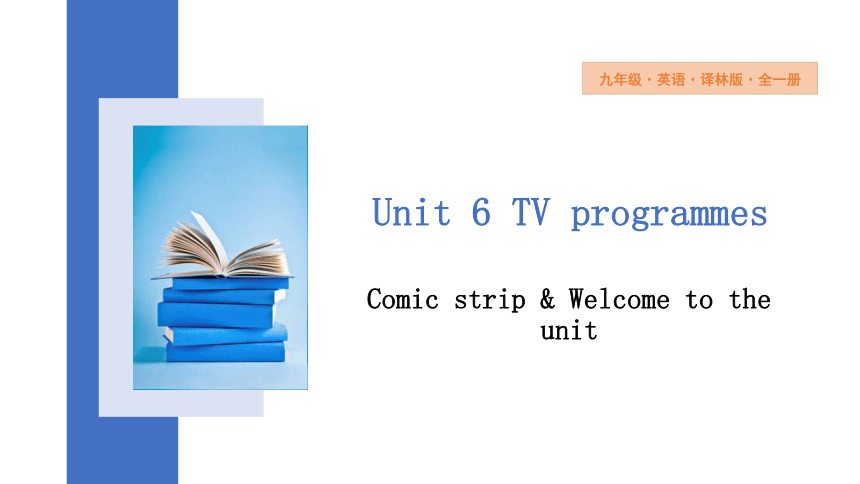 | |
| 格式 | pptx | ||
| 文件大小 | 964.4KB | ||
| 资源类型 | 教案 | ||
| 版本资源 | 牛津译林版 | ||
| 科目 | 英语 | ||
| 更新时间 | 2024-01-12 19:17:30 | ||
图片预览

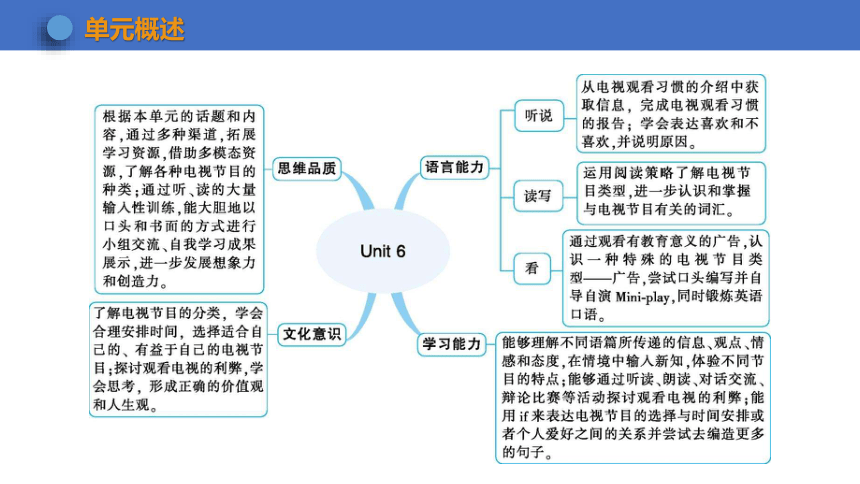
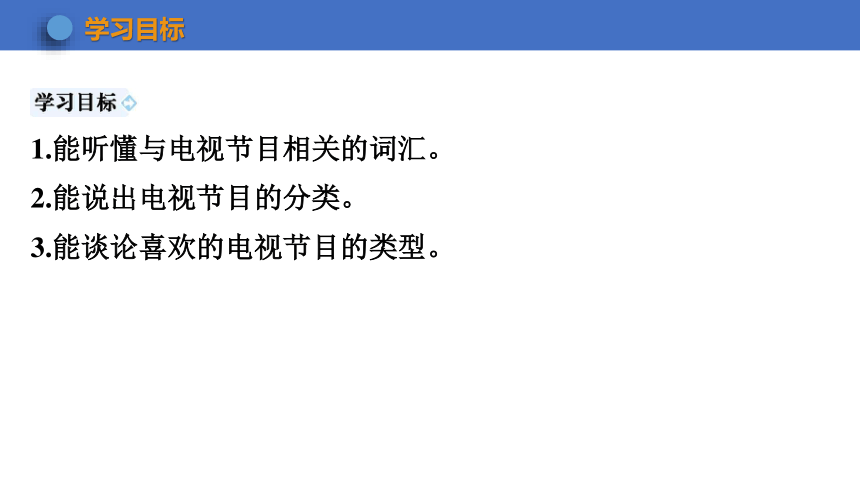


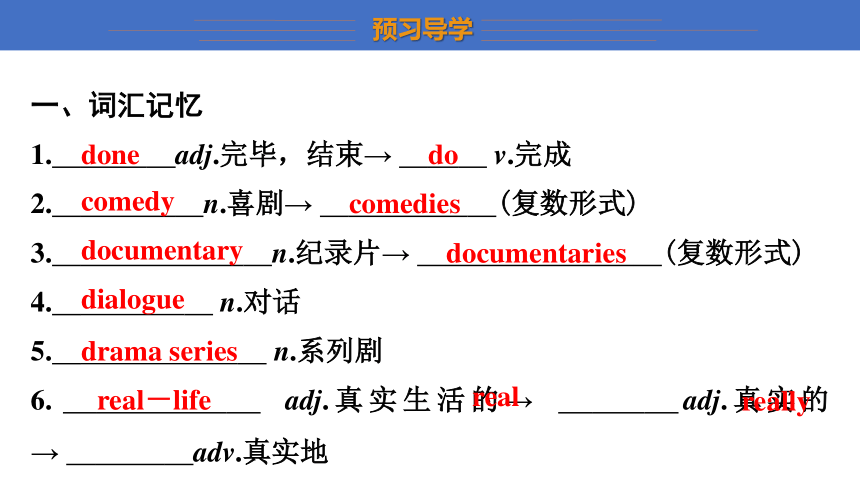


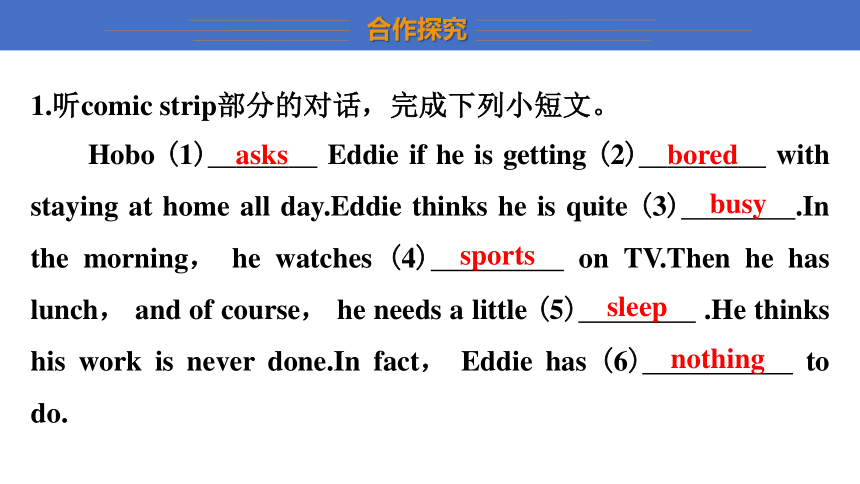
文档简介
(共27张PPT)
九年级·英语·译林版·全一册
Unit 6 TV programmes
Comic strip & Welcome to the unit
1.能听懂与电视节目相关的词汇。
2.能说出电视节目的分类。
3.能谈论喜欢的电视节目的类型。
1.完成任务驱动一,达成学习目标1、2。
2.完成任务驱动二,达成学习目标3。
·导学建议·
展示一些关于电视节目的图片,以便于导入话题及调动学生的学习热情。
教师用以下问题导入新课:
1.How many types of TV programmes do you know?
2.What are they?
3.Which is your favourite TV programme?
一、词汇记忆
1. done adj.完毕,结束→ do v.完成
2. comedy n.喜剧→ comedies (复数形式)
3. documentary n.纪录片→ documentaries (复数形式)
4. dialogue n.对话
5. drama series n.系列剧
6. real-life adj.真实生活的→ real adj.真实的→ really adv.真实地
done
do
comedy
comedies
documentary
documentaries
dialogue
drama series
real-life
real
really
二、短语速记
1.无事可做have nothing to do
2.需要睡一小会儿need a little sleep
3.电视节目的类型types of TV programmes
4.访谈节目chat show
5.有一天 one day
6.获得一个大奖win a big prize
have nothing to do
need a little sleep
types of TV programmes
chat show
one day
win a big prize
听说训练
·导学建议·
播放课本comic strip 的录音,如果学生需要,可以多播放几遍。
1.听comic strip部分的对话,完成下列小短文。
Hobo (1) asks Eddie if he is getting (2) bored with staying at home all day.Eddie thinks he is quite (3) busy .In the morning, he watches (4) sports on TV.Then he has lunch, and of course, he needs a little (5) sleep .He thinks his work is never done.In fact, Eddie has (6) nothing to do.
asks
bored
busy
sports
sleep
nothing
◎学法指导:在听录音之前先仔细阅读对话,理清意思,有助于提高准确率。
2.自由讨论。
和同伴一起讨论以下几个问题。
(1)Do you like watching TV?
(2)How often do you watch TV?
(3)How long do you watch TV every day?
(4)What types of TV programmes do you know?
3.听B部分对话,完成下面的表格。
·导学建议·
让学生讨论各种电视类型的特点,增加学生对材料的熟悉度。
Names Favorite kinds of TV programmes Reasons
Millie documentaries learn a lot about nature, history and real-life events
Daniel game shows hope to take part in one of them and win a big prize
documentaries
learn a lot about nature, history
and real-life events
game shows
hope to take part in one of them
and win a big prize
Names Favorite kinds of TV programmes Reasons
Amy chat shows listen to famous people talking about their lives
Simon cartoons Tom and Jerry is his favourite.
chat shows
listen to famous people talking
about their lives
cartoons
Tom and Jerry is his favourite.
◎学法指导:听填信息时,可以采取速记的方法,先快速记下核心词汇或用符号标记词汇,听完后再整理答案,这样可以避免漏听对话信息。
情境演练
·导学建议·
让学生五人一组,分角色练习对话。挑选表现较好的几组队伍上台展示。
1.五人一组,互相讨论各自最喜欢的电视节目类型及原因。
参考语言结构:
What type of TV programmes do you like best?
What’s your favourite type of TV programmes?
Why?
Do you know your friend’s favourite type of TV programmes?
l like...because...
I like watching...because ...
l don’t like/dislike...because ...
2.分享报告。
·导学建议·
学生进行完对话训练后,引导学生根据讨论结果形成文字,增强书面表达能力。
根据小组讨论的结果,写一份分享报告,在组内展示。
Students in our group like different types of TV programmes.
I need a little sleep.我需要小憩一下。
◎观察思考:
We need to buy a computer.我们需要买一台电脑。
You needn’t worry about the exam.Take it easy。你不需要担心考试。放松一些。
◎用法总结:
need作实义动词,意为“需要”,常见搭配:need sth.“需要某物”;need to do sth.“需要做某事”;sth.need doing=sth.need to be done“某事需要被做”。此外,need还可作情态动词,意为“需要”,常用于否定句或疑问句。
用括号中单词的正确形式填空。
1.The bike needs repairing/to be repaired (repair).
2.We needn’t walk (walk) to the library tomorrow.
repairing/to be repaired
walk
There are always famous people on these shows talking about their lives.这些节目中总是有名人谈论他们的生活。
◎观察思考:
There is a man sitting under the tree.这儿有个人坐在树底下。
There is a baby sleeping in the room.房间里有个正在睡觉的婴儿。
◎用法总结:
1.“There be+sb./sth.+doing sth.+地点”表示“某地有某人或某物正在做某事”。其中doing sth.是后置定语,与其修饰的词是逻辑上的主谓关系,表示人与动作是主动关系。例如:
There is a truck collecting the rubbish over there.在那边有一辆卡车正在收垃圾。
2.在there be句型中,当主语为多个并列的名词时,be动词的形式与离它最近的名词保持一致,即遵循“就近原则”。例如:
There is a science lab and two libraries in my school.=There are two libraries and a science lab in my school.我的学校有一个科学实验室和两个图书馆。
用括号中单词的正确形式填空。
1.There are some people picking (pick) apples on the farm.
2.There are (be) three documentaries and one game show for you to choose.
picking
are
九年级·英语·译林版·全一册
Unit 6 TV programmes
Comic strip & Welcome to the unit
1.能听懂与电视节目相关的词汇。
2.能说出电视节目的分类。
3.能谈论喜欢的电视节目的类型。
1.完成任务驱动一,达成学习目标1、2。
2.完成任务驱动二,达成学习目标3。
·导学建议·
展示一些关于电视节目的图片,以便于导入话题及调动学生的学习热情。
教师用以下问题导入新课:
1.How many types of TV programmes do you know?
2.What are they?
3.Which is your favourite TV programme?
一、词汇记忆
1. done adj.完毕,结束→ do v.完成
2. comedy n.喜剧→ comedies (复数形式)
3. documentary n.纪录片→ documentaries (复数形式)
4. dialogue n.对话
5. drama series n.系列剧
6. real-life adj.真实生活的→ real adj.真实的→ really adv.真实地
done
do
comedy
comedies
documentary
documentaries
dialogue
drama series
real-life
real
really
二、短语速记
1.无事可做have nothing to do
2.需要睡一小会儿need a little sleep
3.电视节目的类型types of TV programmes
4.访谈节目chat show
5.有一天 one day
6.获得一个大奖win a big prize
have nothing to do
need a little sleep
types of TV programmes
chat show
one day
win a big prize
听说训练
·导学建议·
播放课本comic strip 的录音,如果学生需要,可以多播放几遍。
1.听comic strip部分的对话,完成下列小短文。
Hobo (1) asks Eddie if he is getting (2) bored with staying at home all day.Eddie thinks he is quite (3) busy .In the morning, he watches (4) sports on TV.Then he has lunch, and of course, he needs a little (5) sleep .He thinks his work is never done.In fact, Eddie has (6) nothing to do.
asks
bored
busy
sports
sleep
nothing
◎学法指导:在听录音之前先仔细阅读对话,理清意思,有助于提高准确率。
2.自由讨论。
和同伴一起讨论以下几个问题。
(1)Do you like watching TV?
(2)How often do you watch TV?
(3)How long do you watch TV every day?
(4)What types of TV programmes do you know?
3.听B部分对话,完成下面的表格。
·导学建议·
让学生讨论各种电视类型的特点,增加学生对材料的熟悉度。
Names Favorite kinds of TV programmes Reasons
Millie documentaries learn a lot about nature, history and real-life events
Daniel game shows hope to take part in one of them and win a big prize
documentaries
learn a lot about nature, history
and real-life events
game shows
hope to take part in one of them
and win a big prize
Names Favorite kinds of TV programmes Reasons
Amy chat shows listen to famous people talking about their lives
Simon cartoons Tom and Jerry is his favourite.
chat shows
listen to famous people talking
about their lives
cartoons
Tom and Jerry is his favourite.
◎学法指导:听填信息时,可以采取速记的方法,先快速记下核心词汇或用符号标记词汇,听完后再整理答案,这样可以避免漏听对话信息。
情境演练
·导学建议·
让学生五人一组,分角色练习对话。挑选表现较好的几组队伍上台展示。
1.五人一组,互相讨论各自最喜欢的电视节目类型及原因。
参考语言结构:
What type of TV programmes do you like best?
What’s your favourite type of TV programmes?
Why?
Do you know your friend’s favourite type of TV programmes?
l like...because...
I like watching...because ...
l don’t like/dislike...because ...
2.分享报告。
·导学建议·
学生进行完对话训练后,引导学生根据讨论结果形成文字,增强书面表达能力。
根据小组讨论的结果,写一份分享报告,在组内展示。
Students in our group like different types of TV programmes.
I need a little sleep.我需要小憩一下。
◎观察思考:
We need to buy a computer.我们需要买一台电脑。
You needn’t worry about the exam.Take it easy。你不需要担心考试。放松一些。
◎用法总结:
need作实义动词,意为“需要”,常见搭配:need sth.“需要某物”;need to do sth.“需要做某事”;sth.need doing=sth.need to be done“某事需要被做”。此外,need还可作情态动词,意为“需要”,常用于否定句或疑问句。
用括号中单词的正确形式填空。
1.The bike needs repairing/to be repaired (repair).
2.We needn’t walk (walk) to the library tomorrow.
repairing/to be repaired
walk
There are always famous people on these shows talking about their lives.这些节目中总是有名人谈论他们的生活。
◎观察思考:
There is a man sitting under the tree.这儿有个人坐在树底下。
There is a baby sleeping in the room.房间里有个正在睡觉的婴儿。
◎用法总结:
1.“There be+sb./sth.+doing sth.+地点”表示“某地有某人或某物正在做某事”。其中doing sth.是后置定语,与其修饰的词是逻辑上的主谓关系,表示人与动作是主动关系。例如:
There is a truck collecting the rubbish over there.在那边有一辆卡车正在收垃圾。
2.在there be句型中,当主语为多个并列的名词时,be动词的形式与离它最近的名词保持一致,即遵循“就近原则”。例如:
There is a science lab and two libraries in my school.=There are two libraries and a science lab in my school.我的学校有一个科学实验室和两个图书馆。
用括号中单词的正确形式填空。
1.There are some people picking (pick) apples on the farm.
2.There are (be) three documentaries and one game show for you to choose.
picking
are
